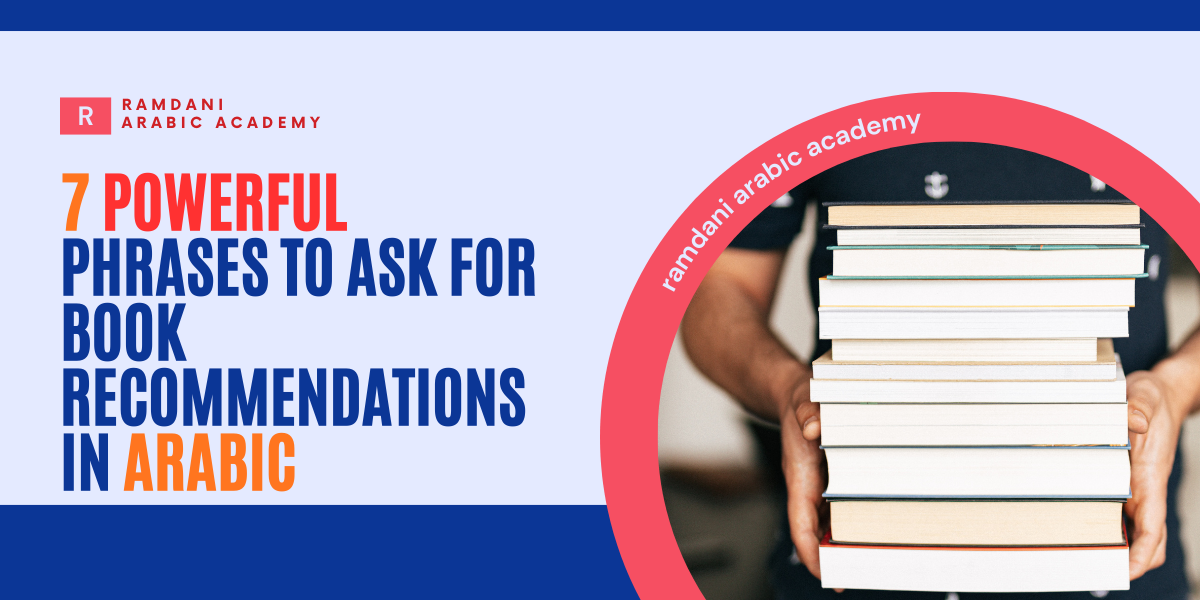7 Powerful Phrases to Ask for Book Recommendations in Arabic
Walking into a bookstore can be exciting and overwhelming at the same time. Shelves full of books, rows of authors you may not know, and hundreds of titles staring back at you can make it hard to choose. If you are learning Arabic, this challenge gets even bigger. You might worry about how to speak to the bookseller, how to explain what you are looking for, or even how to understand their response. Many Arabic learners face this situation the first time they visit a bookstore in an Arabic-speaking country or even an online Arabic bookstore. This is where knowing how to ask for recommendations becomes important.
Being able to ask for book suggestions in Arabic is more than a language exercise. It is a way to connect with Arabic culture and with people who love books. It helps you discover authors you would not find by yourself. It also makes your learning process faster because you will end up with books that match your level and interests. The bookstore staff is usually happy to guide readers, but they can only help if you know how to ask clearly.
When you think about it, asking for recommendations is a real-life skill that every learner needs. You will use it when you visit libraries, when you join book clubs, and even when you talk with Arabic-speaking friends about what to read next. The good news is that it does not have to be difficult. You just need to know a few key phrases, the right questions to ask, and some cultural tips about how to approach the conversation.
In this article, we will go step by step through everything you need to know. We will look at common Arabic phrases for asking for book suggestions, how to explain what type of books you like, and how to respond when the bookseller gives you options. We will also cover how to practice this skill so you can feel more confident the next time you need to use it.
This topic matters because Arabic has a rich literary tradition. From classical poetry to modern novels, from religious texts to contemporary non-fiction, Arabic literature offers something for every reader. But for learners, the wrong choice can be discouraging. A book that is too hard might make you stop reading. A book that is too easy might not teach you anything new. This is why recommendations are key — they save you time, keep you motivated, and help you learn faster.
Think of this article as a guide you can come back to whenever you need. Take notes, practice the phrases we share, and try them out the next time you shop for books. Over time, you will get better at asking for help in Arabic and you will build your confidence as a learner.

Part 1: Practical Phrases and Vocabulary for Asking for Recommendations in Arabic
Before you can ask for book suggestions in Arabic, you need the right words. You do not have to speak perfect Arabic to be understood. A few clear and polite phrases will go a long way.
Basic Greeting
- السلام عليكم – As-salāmu ʿalaykum – Peace be upon you
- مرحبا – Marḥabā – Hello
- صباح الخير / مساء الخير – Ṣabāḥ al-khayr / Masāʾ al-khayr – Good morning / Good evening
The bookseller will often reply with وعليكم السلام (wa-ʿalaykum as-salām) or صباح النور (ṣabāḥ an-nūr).
Asking for Help
Once you greet them, you can ask for help politely.
- هل يمكنك مساعدتي؟ – Hal yumkinuka musāʿadatī? – Can you help me?
- أبحث عن كتاب جيد. – Abḥathu ʿan kitāb jayyid. – I am looking for a good book.
- أريد توصية. – Urīdu tawṣiyah. – I want a recommendation.
You can also combine them for a natural request:
- السلام عليكم، هل يمكنك مساعدتي؟ أريد توصية لكتاب مناسب.
– Peace be upon you, can you help me? I want a good book recommendation.
Explaining What You Like
Bookstore staff will give better suggestions if you tell them what you enjoy.
- أحب الروايات. – Uḥibbu ar-riwāyāt. – I like novels.
- أفضل كتب التاريخ. – Ufaḍḍilu kutub at-tārīkh. – I prefer history books.
- أبحث عن كتب لتعلم العربية. – Abḥathu ʿan kutub li-taʿallum al-ʿarabiyya. – I am looking for books to learn Arabic.
- أريد كتاباً سهلاً. – Urīdu kitāban sahlān. – I want an easy book.
- أريد كتاباً صعباً قليلاً لتحسين لغتي. – Urīdu kitāban ṣaʿban qalīlan li-taḥsīn lughatī. – I want a slightly difficult book to improve my language.
This helps the staff narrow down the options to your level.
Asking About Specific Genres
You might want to explore a specific genre. Use these phrases:
- هل عندكم كتب أطفال؟ – Do you have children’s books?
- أريد كتب أدب كلاسيكي. – I want classical literature books.
- أبحث عن كتب دين أو ثقافة. – I am looking for books on religion or culture.
- هل عندكم كتب في العلوم أو التقنية؟ – Do you have books on science or technology?
Asking for the Most Popular or Recommended Books
If you are new to Arabic literature, start with what most people are reading.
- ما هي الكتب الأكثر مبيعاً؟ – What are the bestsellers?
- ماذا تنصحني أن أقرأ؟ – What do you recommend I read?
- ما هو الكتاب الذي يفضله القراء هنا؟ – What book do readers here prefer?
These questions will often get you a strong suggestion.
Understanding the Answer
When the bookseller replies, listen for key words:
- رواية – novel
- مؤلف – author
- مستوى سهل / متوسط / متقدم – easy / medium / advanced level
- سعر – price
- جديد – new
- مشهور – popular
If you do not understand, ask them to repeat or speak slower:
- من فضلك، أعد ذلك. – Please repeat that.
- تحدث ببطء من فضلك. – Speak slowly, please.
Thanking Them
Always end the conversation politely.
- شكراً جزيلاً. – Thank you very much.
- ممتن لمساعدتك. – I am grateful for your help.
This small step leaves a positive impression and builds your confidence for the next time.
Practice Tip
Write these phrases down. Practice them out loud. Record yourself and listen. This helps you get comfortable with the pronunciation. You can even role-play with a friend or teacher. The more you practice, the more natural it will feel when you actually go to a bookstore.

Part 2: Cultural Tips, Common Mistakes, and Building Confidence
Learning phrases is the first step. Using them naturally is the next challenge. Many Arabic learners feel nervous speaking in public. Some even avoid asking for help because they fear making mistakes. This part will help you understand the cultural side of asking for recommendations and how to build confidence when speaking Arabic.
Cultural Tips When Visiting a Bookstore
Bookstores in Arabic-speaking countries can be very different from what you are used to.
- Politeness matters – Greetings are important. Always start with السلام عليكم or at least مرحبا before asking a question.
- Take your time – People do not rush conversations. Allow the bookseller to speak and finish their sentences.
- Show interest – If they recommend a book, pick it up, look at the cover, flip a few pages. This shows respect for their suggestion.
- Ask questions – It is normal to ask about the author, the style, or the difficulty level. Many booksellers enjoy sharing knowledge.
- Use “please” – Add من فضلك (please) when asking for help. It makes your request softer and more polite.
These small gestures make the conversation smoother and help you sound respectful.
Common Mistakes Learners Make
Avoid these mistakes when you ask for book recommendations:
- Not greeting first – Jumping straight into the question can sound rude.
- Using only English or another language – Even if your Arabic is basic, try using Arabic first. The effort is appreciated.
- Not giving details – Saying “I want a book” is too general. Say what kind of book you like.
- Choosing books too advanced – Many learners pick books that are too hard and give up quickly. Start with books just a little above your level.
- Forgetting to ask about price – Prices can vary a lot. Learn to ask كم سعر هذا الكتاب؟ (How much is this book?) before deciding.
When you know these mistakes, you can avoid them and make the process smoother.
Building Confidence in Speaking
Confidence does not come from knowing every word. It comes from using what you already know.
- Practice small conversations daily – Even 5 minutes of speaking can make a difference.
- Memorize a few “safe” phrases – For example, “السلام عليكم، أبحث عن كتاب سهل.” You can always start with this line.
- Accept mistakes – You will mispronounce words or forget vocabulary sometimes. Keep going. Most people will still understand you.
- Listen and repeat – Watch short Arabic videos about books or bookstores. Repeat the phrases you hear until they sound natural.
- Visit bookstores often – The more you go, the less nervous you feel. Even if you do not buy anything, practice asking questions.
Confidence grows with use. The first time you speak might feel hard. The second time is easier. By the fifth time, you will feel much more comfortable.
Role-Playing at Home
Role-play is one of the most effective ways to prepare. Here is how you can do it:
- Write a small dialogue between you and a bookseller.
- Read both parts out loud.
- Switch roles and repeat.
- Record yourself and listen.
Example:
- You: السلام عليكم، أبحث عن كتاب في الأدب العربي.
- Bookseller: وعليكم السلام، تفضل. هل تريد كتاباً سهلاً أم متقدماً؟
- You: كتاباً سهلاً لو سمحت.
- Bookseller: أنصحك بهذا الكتاب، إنه مشهور وسهل الفهم.
- You: شكراً جزيلاً.
Practicing this dialogue several times will make it easier when you go to the store.
Handling Difficult Situations
Sometimes the bookseller might speak too fast, use words you do not know, or recommend something you do not want. Here is how to handle it:
- Ask them to repeat – من فضلك أعد ذلك.
- Say you do not understand – آسف، لم أفهم.
- Be honest about your level – أنا مبتدئ في العربية. أريد كتاباً بسيطاً.
- Thank them even if you do not buy – شكراً لمساعدتك.
This keeps the conversation friendly and encourages you to try again next time.
Why This Skill Matters
Asking for recommendations is not just about getting a book. It helps you practice real conversation. You learn new words, hear natural pronunciation, and experience Arabic culture in action. It is a safe, low-pressure way to speak Arabic because booksellers are usually patient and happy to help.
If you repeat this skill over time, you will notice that your vocabulary grows. You will learn new genres, new author names, and you will discover books that keep you motivated. This can be one of the most effective ways to build your reading habit in Arabic.

Part 3: Step-by-Step Guide and Example Conversations
You have the phrases and cultural tips. Now it is time to put everything together into a simple plan you can follow. A step-by-step approach makes it easier to remember what to do and helps you stay calm during the interaction.
Step 1: Prepare Before You Go
Preparation makes you more confident.
- Write down three phrases you will definitely use. Example: greeting, asking for a recommendation, thanking them.
- Think about what type of book you want. Decide if you want a novel, a short story, a children’s book, or a language-learning book.
- Practice the pronunciation of key words. Record yourself saying them. Listen until you are comfortable.
Being clear on what you want before you arrive saves time and reduces stress.
Step 2: Start with a Greeting
Walk in, make eye contact, and greet the bookseller.
- السلام عليكم or مرحبا
- Add a smile if you can. This small step sets the tone for a friendly conversation.
Step 3: Ask for Help
Once you greet them, politely ask for assistance.
Example:
- هل يمكنك مساعدتي؟ أبحث عن كتاب سهل. – Can you help me? I am looking for an easy book.
If you want a specific genre, add it here.
- أريد رواية قصيرة لو سمحت. – I want a short novel, please.
Step 4: Explain Your Preferences
Tell them more about what you enjoy. This helps them find a book you will actually read.
- Say what type of story you like: romance, history, science, poetry.
- Tell them your level: beginner, intermediate, or advanced.
- Mention if you want something fun or educational.
Example:
- أنا مبتدئ وأحب القصص البسيطة. – I am a beginner and I like simple stories.
Step 5: Listen to Their Suggestions
They may give you several options. Take a moment to look at each book. Read the title and check the cover. Flip through a few pages to see if the text looks readable for you.
If you are not sure, ask a follow-up question:
- هل هذا الكتاب مناسب للمبتدئين؟ – Is this book suitable for beginners?
- هل اللغة في هذا الكتاب سهلة؟ – Is the language in this book easy?
Step 6: Ask About Price
Always check the price before deciding.
- كم سعر هذا الكتاب؟ – How much is this book?
If it is too expensive, you can politely decline:
- شكراً، ربما في المرة القادمة. – Thank you, maybe next time.
Step 7: Make Your Choice
When you find a book that feels right, confirm your decision.
- سآخذ هذا الكتاب. – I will take this book.
Step 8: End with Thanks
Finish with gratitude.
- شكراً جزيلاً لمساعدتك. – Thank you very much for your help.
This leaves a positive impression and makes the interaction pleasant for both sides.
Example Conversation 1: Beginner Learner
You: السلام عليكم
Bookseller: وعليكم السلام
You: أبحث عن كتاب بسيط لتعلم العربية.
Bookseller: لدينا هذا الكتاب، إنه مشهور وسهل الفهم.
You: شكراً. كم سعر هذا الكتاب؟
Bookseller: عشرون دولاراً.
You: جيد، سآخذه. شكراً جزيلاً.
This short conversation uses simple language and gets straight to the point.
Example Conversation 2: Intermediate Learner
You: مساء الخير
Bookseller: مساء النور
You: أريد رواية قصيرة عن الثقافة العربية.
Bookseller: أنصحك بهذه الرواية، إنها عن الحياة في القاهرة.
You: ممتاز، هل اللغة صعبة؟
Bookseller: لا، هي مناسبة لمستوى متوسط.
You: رائع. شكراً لمساعدتك.
This conversation adds a question about difficulty and shows interest in the topic.
Example Conversation 3: Advanced Learner
You: السلام عليكم
Bookseller: وعليكم السلام
You: هل عندكم كتب في الفلسفة الإسلامية؟
Bookseller: نعم، لدينا عدة كتب لابن رشد والغزالي.
You: أي كتاب تنصح به كبداية؟
Bookseller: أنصح بكتاب تهافت الفلاسفة، لغته قوية لكنه مفيد.
You: شكراً، سأفكر في الأمر.
This shows how to handle more advanced topics and politely delay a decision if you are not ready to buy.
Practice Routine for Learners
Follow this simple routine to master bookstore conversations:
- Choose one example conversation.
- Read it out loud every day for a week.
- Try it without looking at the text.
- Record yourself and notice where you hesitate.
- Go to a real bookstore and use it.
This routine builds fluency and confidence.

Practical Advice, and About the Author and Academy
Learning how to ask for book recommendations in Arabic is a skill that opens doors. It helps you discover books you would never find on your own, and it gives you valuable speaking practice in a real situation. Each time you greet the bookseller, ask a question, and listen to their answer, you build confidence and improve your language skills.
If you are serious about learning Arabic, do not limit yourself to textbooks. Bookstores are full of materials that can keep your learning fresh. Stories, essays, children’s books, and short novels all offer a chance to see real Arabic in action. Reading is one of the fastest ways to grow your vocabulary and understand how words are used naturally.
Practical Advice for Learners
- Start small – Choose short books with clear language. Do not start with heavy classics right away.
- Ask for help often – Each interaction is practice. The more you ask, the more comfortable you become.
- Keep a reading notebook – Write down new words and phrases from each book. Review them later.
- Mix fun and study – Read for pleasure as well as learning. If you enjoy the book, you will read more.
- Visit different bookstores – Each shop has its own collection. Explore several to see more options.
Remember that you do not have to speak perfectly. Even short, simple phrases are enough to start a conversation. Politeness and effort go a long way. Most booksellers will support you and appreciate your interest in the Arabic language.
Staying Motivated
Learning Arabic takes time. There will be moments when you feel stuck. Having the right book can make all the difference. A good story can motivate you to keep going even when grammar feels difficult.
Set small goals for yourself:
- Ask for one book recommendation this week.
- Finish one short story this month.
- Learn ten new words from your new book and use them in conversation.
Celebrate these small wins. They build momentum and keep you moving forward.
About Ramdani Arabic Academy
Ramdani Arabic Academy was created to support learners like you. Our mission is to make Arabic learning simple, structured, and enjoyable for students everywhere. We offer lessons, online courses, articles, and practical resources to help you grow step by step. Whether you are a beginner or an advanced learner, we focus on giving you the tools you need to succeed in real life — not just in the classroom.
On our website, you will find guides like this one, videos explaining grammar and vocabulary, and exercises you can do at home. You can also join our online programs where we teach live and answer your questions directly. Many of our students say they gain confidence quickly because we focus on real-life situations, not just theory.
If you enjoyed this article, visit Ramdani Arabic Academy and explore our other materials. You will find resources on how to speak in markets, introduce yourself, ask for directions, and much more. Each guide is designed to help you use Arabic in daily life.
About the Author
My name is Ramdani Mohamed, founder of Ramdani Arabic Academy. I have spent years teaching Arabic to students from around the world. I know the challenges learners face, from building confidence to finding good materials. My goal is to make Arabic accessible for everyone and to help students feel comfortable using it in real conversations.
I believe learning a language should be practical and interactive. That is why I write articles like this — to give learners step-by-step tools they can use right away. If this article helped you, I encourage you to keep practicing, share it with other learners, and stay consistent with your study routine.
Final Thoughts
Next time you walk into a bookstore, try one of the phrases from this guide. Greet the bookseller, ask for a recommendation, and see what happens. Even if you make mistakes, you will learn something new each time. Over time, these small interactions will build your speaking skills and help you connect with Arabic culture in a meaningful way.
Arabic is not just a language — it is a way to explore ideas, history, and stories that have shaped millions of people. Every book you read is a step deeper into that world. Keep reading, keep asking questions, and keep growing.







